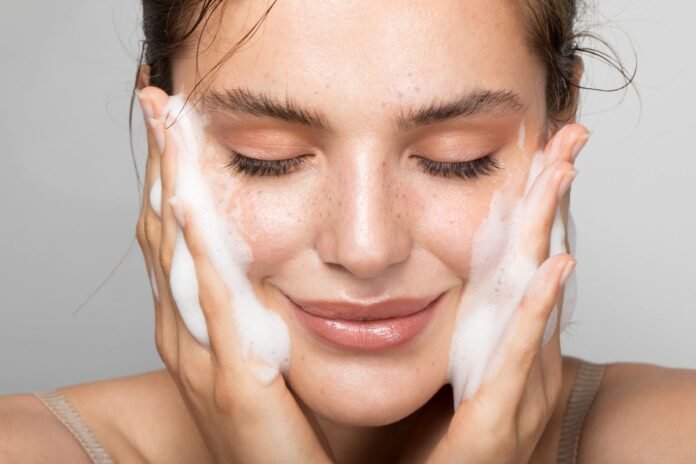The year 2024 revolutionized skincare routines with a mix of scientific innovation and unconventional practices. Consumers leaned into dermatologist-recommended, science-backed products while exploring offbeat trends that redefined traditional beauty standards. Dermatologists predict that this heightened focus on informed choices will shape the demand for skincare products in 2025.
One standout trend this year was the rise of powder sunscreens and sunscreen sticks. These alternatives provided solutions for specific needs, particularly for individuals with oily or acne-prone skin. Dermatologist Dr. Monica Bambroo highlighted the convenience of powder sunscreens while cautioning against relying solely on them for long sun exposure. She emphasized their limitations in achieving even coverage and their inability to replace traditional creams or lotions for comprehensive protection.
Sunscreen sticks also gained popularity, especially for their ease of application on smaller areas like the face and ears. Their compact nature made them travel-friendly, but Dr. Bambroo noted their thicker consistency often posed challenges for even application on larger areas. Despite these limitations, these innovations made significant strides in encouraging sun protection habits.
The year also witnessed a surge in unconventional treatments involving bodily fluids. Preventive healthcare expert Dr. Apurrva Sawant pointed out that breast milk, placenta, and even semen masks made headlines as potential skincare remedies. Dermatologist Dr. Rupika Singh added that nightingale droppings facials gained traction for their exfoliating and brightening properties. While these methods sparked curiosity, experts emphasized the importance of scientific validation before adopting such practices.
Another viral trend in 2024 was the resurgence of snail mucin as a hydrating and anti-aging ingredient. Its slimy texture initially raised eyebrows, but its efficacy in improving skin texture and elasticity won over skeptics. As skincare enthusiasts sought natural yet effective solutions, snail mucin emerged as a trusted staple.
This year also celebrated a shift towards barrier-repair products. With increasing awareness of the skin’s microbiome, consumers prioritized strengthening their skin barrier to combat sensitivity, redness, and environmental damage. Probiotics and prebiotics became buzzwords in skincare, highlighting their role in maintaining a healthy skin ecosystem.
Customizable skincare saw a significant boom, with brands offering personalized formulations tailored to individual skin types and concerns. This bespoke approach resonated with consumers seeking effective solutions without the trial-and-error process. Digital tools and AI-driven consultations became integral in designing these personalized regimens, marking a new era of tech-savvy beauty solutions.
Social media played a pivotal role in spreading awareness about these trends. Viral TikTok videos and Instagram reels showcased innovative products and quirky hacks, pushing boundaries and challenging norms. From experimenting with frozen cucumber masks to reviewing high-tech LED masks, influencers shaped conversations around skincare while encouraging users to prioritize self-care.
Despite these advancements, the skincare community faced its share of challenges. The overemphasis on viral trends occasionally overshadowed the need for proper research and dermatologist consultation. Experts urged consumers to approach new trends cautiously, ensuring safety and efficacy before incorporating them into routines.
Looking ahead to 2025, dermatologists anticipate a continued focus on science-backed formulations. The demand for sustainable and eco-friendly products will grow, as consumers become more environmentally conscious. Hybrid skincare-makeup products are also expected to dominate shelves, offering the benefits of skincare with the coverage of cosmetics.
The year 2024 proved that skincare is not just about aesthetics but also about self-expression, innovation, and well-being. As trends evolve, one thing remains clear—skincare will continue to be a dynamic and transformative space that caters to the ever-changing needs of individuals while promoting confidence and self-care.
The year also marked a notable rise in DIY skincare practices. Inspired by natural ingredients and traditional remedies, many individuals experimented with creating their own face masks, serums, and exfoliants at home. Ingredients like turmeric, honey, aloe vera, and yogurt found a place in homemade concoctions, emphasizing the appeal of simplicity and accessibility in skincare. However, dermatologists consistently warned against the risks of allergic reactions and the importance of patch testing before trying new DIY recipes.
K-beauty trends maintained their dominance, with glass skin routines continuing to captivate global audiences. The multi-step approach to achieving radiant, dewy skin gained new followers as it emphasized hydration, gentle exfoliation, and consistent sun protection. Sheet masks infused with unique ingredients like pearl powder, green tea, and marine collagen became staples for skincare enthusiasts looking to replicate the flawless glow synonymous with Korean beauty.
In 2024, the conversation around inclusivity in skincare deepened. Brands expanded their product lines to cater to diverse skin tones and types, addressing long-standing gaps in the market. Foundations with SPF designed for deeper skin tones and products formulated for conditions like melasma or hyperpigmentation received widespread praise. Experts welcomed this shift, underscoring the importance of addressing specific skin concerns to create truly inclusive solutions.
Meanwhile, tech-driven skincare gadgets gained popularity among tech-savvy consumers. Devices like facial massagers, microcurrent tools, and ultrasonic cleansers promised salon-quality results at home. While these innovations offered convenience, dermatologists highlighted the importance of proper usage and realistic expectations to avoid overuse or skin damage.
The influence of celebrity-backed brands also surged, as stars launched skincare lines reflecting their personal philosophies. From minimalist approaches to ingredient-heavy formulations, these brands often carried the message of self-care and empowerment. Their visibility on social media platforms ensured widespread adoption, further blurring the lines between celebrity influence and consumer trust.
As the year concluded, the overarching theme remained one of experimentation balanced with education. While 2024 introduced exciting new trends and practices, it also underscored the value of a back-to-basics approach centered on understanding individual skin needs. This mindful blend of innovation and simplicity is expected to set the tone for skincare in 2025.

